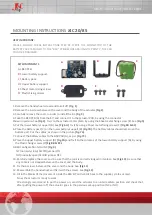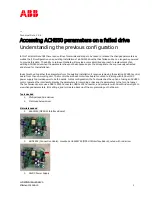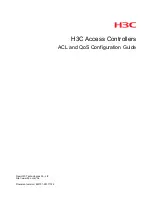
TINY-2/MICRO-2 Technical Ref., 2. Ed 1989
- 12 -
HARDWARE DESCRIPTION
This section includes detailed hardware specifications and a functional description of the hardware
design of the TINY-2 and MICROPOWER-2 packet controllers. Specifications apply to both packet
controller models unless specified otherwise. MICROPOWER-2 specifications (when different) will
be placed in square brackets [ ]. Firmware specifications and operating instructions are contained
in the Operating Manual.
LEDs
PWR
The POWER LED is illuminated whenever the TINY-2/MICRO-2 is connected to a power
source and the power switch is on.
CON
The CONNECT LED illuminates when an AX.25 connection exists on the selected stream for
that port. (See multi-connection explanation in Operating Manual).
STA
The STATUS LED illuminates whenever an AX.25 frame has been sent but not yet acknowl-
edged. If a connection is to be terminated (DISCONNECTED) and the STA LED is lit, some
frames which were sent but not acknowledged may be lost.
PTT
The PTT LED illuminates whenever the TINY-2/MICRO-2 activates the radio keying line.
DCD
The DCD LED illuminates when the modem senses a signal.
Detailed Circuit Description
Oscillator: The crystal, capacitors and resistors in the 74HC4060 (U7) circuit provide for a sta-
ble clock source for the 4.9152 MHz master clock. The 74HC4060 also provides all baud clocks
(X16) and a 600 Hz signal for the real time clock interrupt applied to the SIO (U14) SYNC-B in-
put.
CPU Complex: The microprocessor (U1) is an NMOS Z-80 (8400-06) [CMOS, 84C00-06]. Both
asynchronous serial and HDLC functions are performed by a Z80 SIO/0 (8440-06) [84C40-06]
(U14). The 27256 [27C256] EPROM (32k bytes) (U2) contains all the firmware, addressed from
0 to 7FFF. The 32k × 8 RAM (U8) holds all buffered data and battery backed parameters for
the 8400-06 [84C00-06](Z-80) CPU (U1). RAM is addressed from 8000 to FFFF. Each memory
device's chip select is provided by the 74HC139 decoder (U3), and the RAM chip select is also
buffered by a power failure detection circuit. When voltage is low or removed, the RAM enters
low power mode, drawing approximately one microamp while retaining memory contents.
Serial Port: SIO (U14) channel B performs asynchronous communications through either a
MAX231 single chip CMOS RS232 transceiver (U15), or at TTL levels, via an 8-pin connector
(P3). RS232 signals are interfaced via an "IBM AT" style DE-9P connector with a DCE pinout.
Baud rates of 300, 1200, 2400, 4800, 9600 and 19.2k are supported.
HDLC: The HDLC function is performed by SIO (U14) channel A connected to the modem dis-
connect header (J5), and to the on-board integrated circuit modem. Data rates of 300 bauds to
19.2 kilobauds are supported at the header. The SIO HDLC data signal is converted from NRZ
to NRZI in two logic stages enroute to the modem.
Watchdog Timer: The SIO (U14) RTSA (pin 17) provides the signal that ultimately keys the ra-
dio transmitter. When the TINY-2/MICRO-2 is transmitting, RTSA goes low, which is fed to a
Schmidt trigger gate (U6 pin 9) which turns on the PTT LED and returns a high signal to the
gate of a VN10 (FET) transistor (Q2). This high state on the VN10 gate causes it to conduct to
ground, keying the transmitter, and starts C26 charging through R17. If the RTSA Signal re-
mains low more than 60 seconds, C26 reaches the Schmidt trigger voltage, causing the gate
(U6) to turn off the PTT LED and the VN1 0, thus unkeying the transmitter.













































